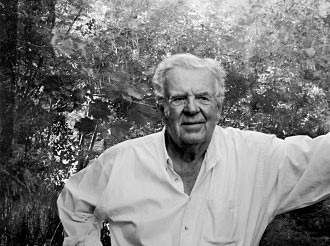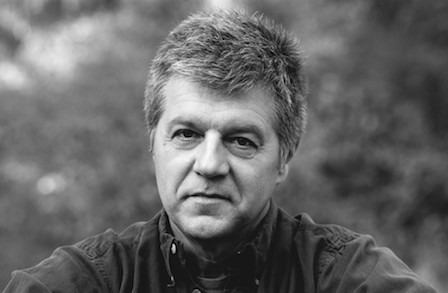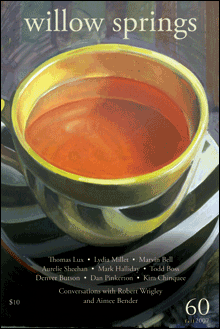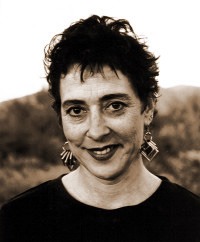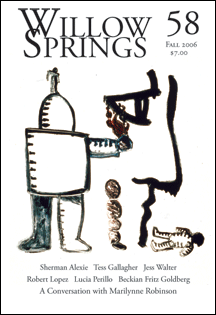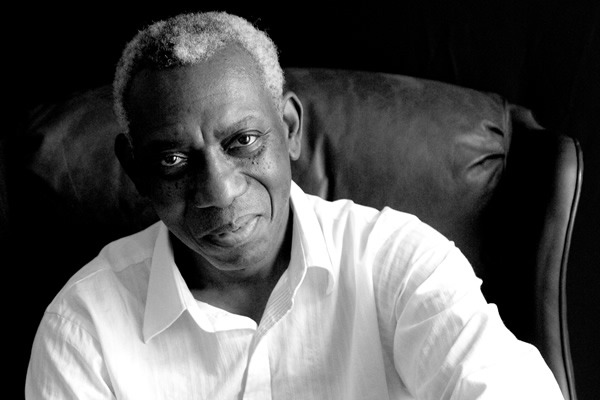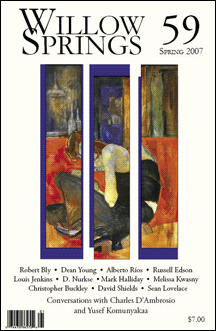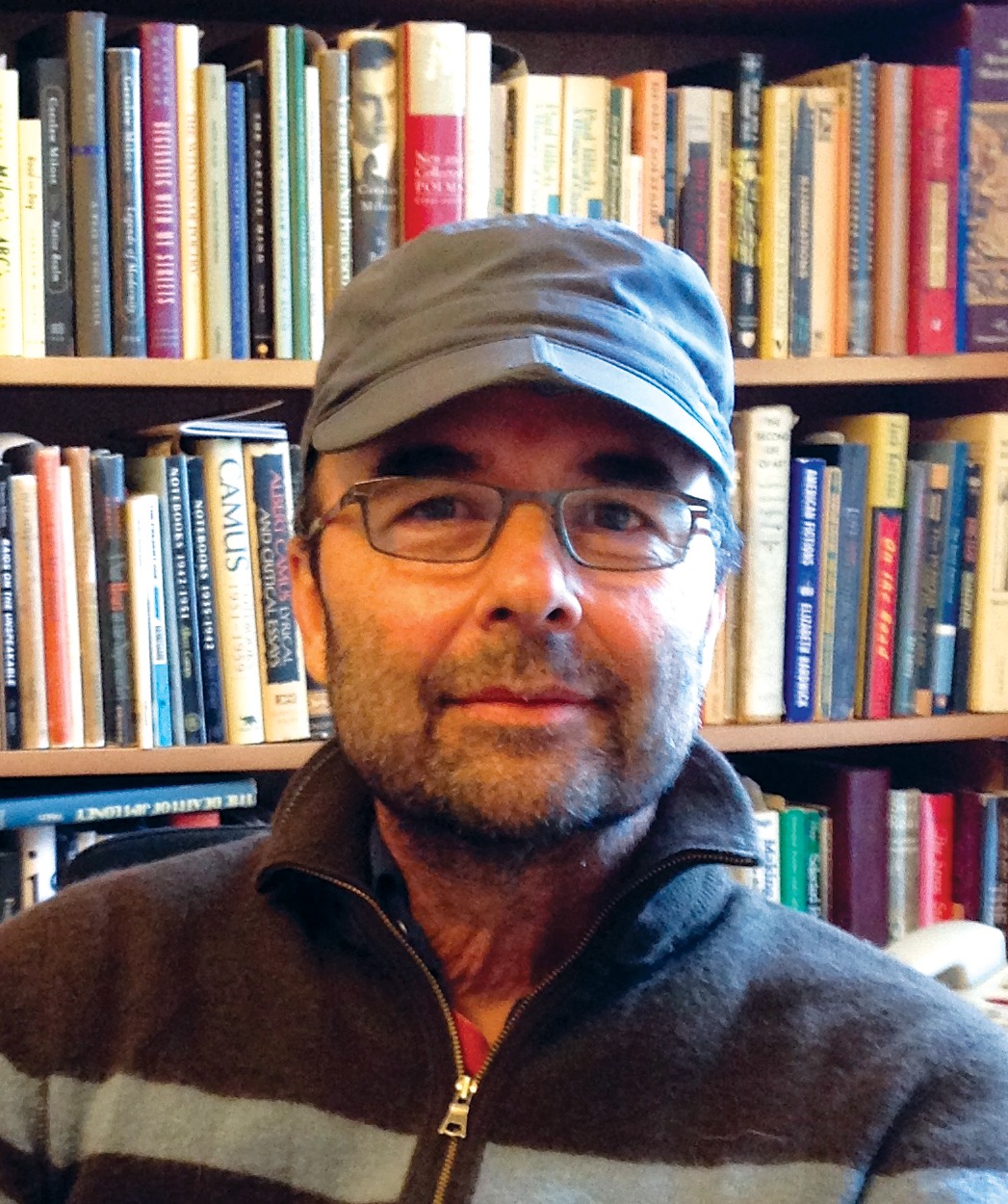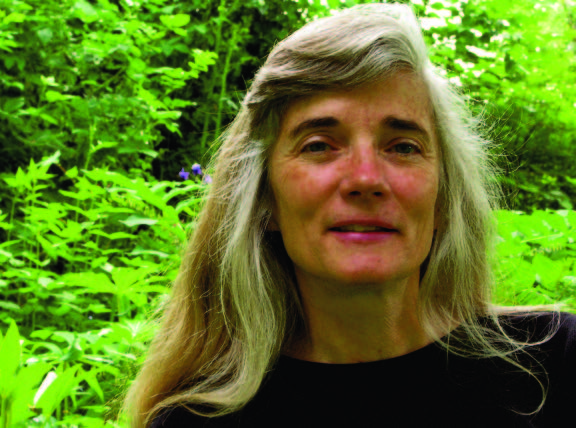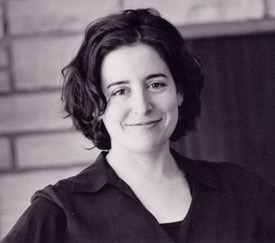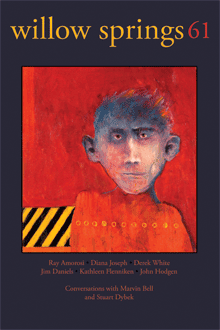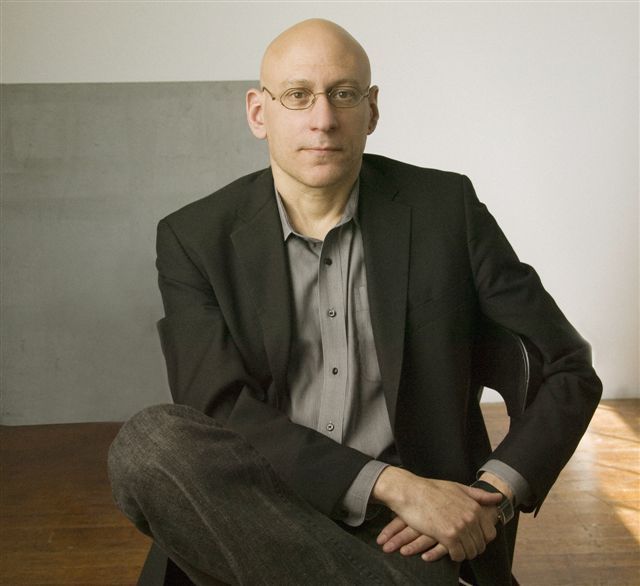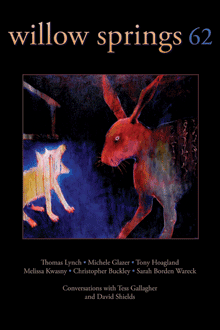MANY REVIEWS of Charles D’Ambrosio’s work compare it to the short stories of Raymond Carver, Thom Jones, and Denis Johnson. D’Ambrosio is the author of an essay collection, Orphans (Clear Cut, 2004), and two short story collections: The Point (Little, Brown, 1995), a PEN/Hemingway Award Finalist and New York Times Notable Book of the Year, and The Dead Fish Museum (Knopf, 2006). His work has appeared in The New Yorker, The Paris Review, The Pushcart Anthology, Best American Short Stories, A Public Space, and elsewhere.
D’Ambrosio grew up in Seattle during the 1970s and 1980s—a place he calls “an old-time, middle-class Seattle”—and attended Oberlin College in Ohio. He received his MFA from the Iowa Writers’ Workshop, where he later served as a visiting faculty member. He now resides in Portland, Oregon, with his wife.
About his writing’s connection to the Pacific Northwest, D’Ambrosio says, “All the original violence of the American project is still vibrating…in a big bang sort of way—you can stand at the end of things and hear the beginning. It makes sense that pattern would show up in my stories.”
D’Ambrosio was interviewed at the Top Hat Lounge & Casino during the Montana Festival of the Book in Missoula.
STEPHEN KNEZOVICH
Today you were talking about “The High Divide,” the first story in your new collection, and you said it took twelve years to write. All your stories seem to have patience in the way they unfold, but are you always so patient?
CHARLES D’AMBROSIO
With “The High Divide,” twelve years passed between the time I completed a first draft to the time I felt it was finished. I haven’t had that experience before, where I kept working on something and failing for reasons I couldn’t pin down. Typically, I’d be more sensible—I’d quit—but with “The High Divide” a year or two would pass and I’d pick it up again and it would fail in the same way. Now I like to think the solution to the story wasn’t so much about improved artistry or deeper insight as it was just time passing.
The story, as I originally wrote it, was animated by hatred. I can’t explain it any other way. But the problem with hatred is that it doesn’t really have any shape—it will never start to close in on itself. Hatred, as a force, works against aesthetic completion, or something. In the end, I kind of changed—that extreme hatred went out of me, just enough—and “The High Divide” became a more loving story. I know that sounds vague, but that’s the path the writing took. At times, the story was extremely long. New characters would come in on draft twenty, but when I’d pick the piece back up, for draft twenty-one, I’d throw those characters out. I was more like a murderer than a writer, hating my creation—all creation, probably. I was all over the map.
Then there are other stories, like “Drummond & Son,” that offer a totally different writing experience. One day I went into a typewriter repair shop in Seattle and saw this wall full of refurbished machines, each with a blank sheet of paper rolled in the platen. When you opened the door of the shop the blank sheets waved back and forth in unison; it was like a writer’s nightmare. And because I like my imagery a bit blunt, a little on the obvious side, I thought this would be perfect for some story, and I went home and rolled a blank sheet of paper—which I still have—in my Olivetti, and I typed down the basic idea of the story, the sketch that would eventually become “Drummond & Son.” But I didn’t write the actual story for like four years. I just had that sheet of paper, a typed suggestion of a story, though much of what I wrote that day survives in the finished story. When I finally sat down to work in earnest, I wrote “Drummond & Son” in a week. But it’s one of those things where, honestly, it took me four years to write.
PETE SHEEHY
In “Drummond & Son,” your description of the typewriter—the worn rollers, the keys that don’t quite go—is so exactly detailed and key to who the character is that it made me wonder if your stories usually come to you through an image or a voice or something else.
D’AMBROSIO
I spend a lot of days early in the writing trying to get the right sound. It’s a kind of music I hear in my head and I want to match it on the page. I have a sense the whole story will unlock once I strike the right note. That was true of “Drummond & Son,” but when I sat down to write the story, I also knew the last line, which I never do. Writers are different: Do you want to know the ending so you know where you’re going, or does knowing the ending somehow kill your desire to go there? Katherine Anne Porter said something like: I never start a story unless I know the ending. I’m just the opposite. It can be horrid if I know the ending. I’ll start steering the narrative, writing to a thesis—everything geared to that ending, and the story loses its vibrancy, because I’m directing it too much. Generally, I do everything I can to keep myself in the dark about the end of a story. In fact, my rule is, if I see the ending too early, then that can’t be the actual end—it’s got to be something else, something I don’t see.
But I knew the last line of that story, almost from the get-go. It was going to be the father saying “I love you” to his son. And I thought to myself: You know, it’s really hard to say “I love you” in real life, but it’s even harder to say in a story. And it’s nearly impossible to have one man say it to another without it being ironic or some sort of joke. The whole project became an attempt to justify that last line, to create the story as a housing for the last line, a housing for that love, really. That was motivating. So it couldn’t be a normal day; it had to be difficult, because that love had to be complex. And even with all this difficulty, something would endure, and Drummond’s innate feelings, while tested, would guide him through a very perilous day, and the love would be unreasonable, stupid—and truer because of it.
KNEZOVICH
You’ve said that “Drummond & Son” is the most traditional story in the collection. Do you think knowing the ending beforehand had something to do with the story’s movement?
D’AMBROSIO
A little. It’s the most linear story: beginning, middle, end. The characters are presented in your typical third-person manner. The story is classical. It’s my attempt to imitate Joyce, the Joyce of Dubliners, with all those decent middle-class figures stressed by circumstances and pressures that seem to come from within the very culture meant to sustain them. In its organization, it’s a very simple story. The complexity is in the language and the images and some of the dialogue, but the story is simple in its movement, and I like that. Part of what I was aware of in that simplicity is that Drummond is not a complex man. I don’t think he’s stupid, but he’s not educated. I imagine that he’s learned most of what he knows from working hard and going to church regularly. He’s repaired typewriters all his life. His father repaired typewriters before him. But he’s in a complex situation: he’s divorced and alone and he’s got a schizophrenic son. His life is complex, but he is not—though that doesn’t mean his capacity for love is any less rich or worthy. So some of that narrative simplicity was guided a little bit by my sense of who the character is. It seemed honest to try to write a simple story about this man, a story that wouldn’t condescend or mock or get all twisty and clever. I worked hard toward the end, removing anything that would sound clever—as a writer you’re always tempted to wink, or pull off something sly. But I tried to be honest.
SHEEHY
Does the short story form still challenge you as much as it did when you wrote The Point?
D’AMBROSIO
I’m working on a novel, so I’m off in other directions, but the form will always be challenging. There are probably people who would say it’s a more complex form, more difficult and demanding than a novel. I don’t know. But the form is where the challenge is in a story: how to capture that density and how to solve all the problems you need to solve inside a limited space. At some point, in every story, I go through a stretch where I think of the writing as pure problem solving. In a way, that’s what you’re confronted with from the very beginning. You can’t have a dead stretch, whereas you can in a novel. [Laughs.] There are great novels where you read thirty pages that don’t exactly come to life, but they don’t kill the novel. With the short story, if you’re not achieving maximum density—using as much inventiveness as possible—you lose the story. Right now, I may be less intrigued by that challenge or maybe I feel a little constrained by it; I want to explore stuff outside of the difficulty of that form.
KNEZOVICH
Was your novel originally conceived as a novel, or did you think of it first as a short story?
D’AMBROSIO
It was definitely a novel from the start. It wasn’t like a short story that just got too big for its britches. I have written stories before that I felt should have been longer, and I spent a lot of time beating them into shape, sometimes willfully and perversely and in ways that, looking back, I can see are unnatural. You know, doing shorthand little things I’m not particularly proud of. But the novel was definitely a novel from the get-go. Though I want it to be a short novel.
SHEEHY
How close are you to finishing?
D’AMBROSIO
Maybe a year away. I’ve written a draft, which I’m rewriting, sort of from the beginning, switching over to the typewriter. I think it’ll be maybe a year.
SHEEHY
Do you have a favorite story in the new collection?
D’AMBROSIO
I’m inordinately fond of “Drummond & Son.” But that’s not necessarily rational or based on quality. I like the way it came together, I like those people, I like the feeling that I captured something true about a particular kind of Seattle I know about, a sort of average Seattle, an old-time, middle-class Seattle—where the middle class was made up of working people.
KNEZOVICH
Why is the collection titled The Dead Fish Museum?
D’AMBROSIO
I chose The Dead Fish Museum in part because it seemed to work as a container that was inclusive enough to hold all the stories. There are quite a few dead fish in the book—almost all the stories include a fish—and then, for a Catholic like myself, the fish is richly suggestive—of Christ, of faith, of miracles—though of course in the stories I don’t use the ready-made symbolism in a direct way; really, I wasn’t even conscious of it as I was writing. The line itself refers to a refrigerator and appears in the story as a concrete line of dialogue. But I was obsessed with questions of faith during this stretch of my life, which is to say I was immersed in doubt, and it seems to me that under stress it’s natural enough to resort to your oldest, best language of hope. Hence the fish—but then the question becomes: Has that old language lost its potency? Does it still resonate? Are our old hopes—of love and faith, of prosperity, of community, of the West, whatever—still intact? And to me that’s where the “museum” part of the title plays into the thing. It seems at times that we’re living in a “God is dead” world, post-everything, where our most cherished notions—love and faith, children, wisdom, you name it—are pathetic relics or sentimental longings for a gone world. Our deepest hopes are museum curiosities, no different, really, than the pot shards or primitive sandals you might find in a display case.
In Dead Fish, each story was secretly constructed and deviously worked out to deliver a moment where love could be presented without sentimentality or irony, where two people could communicate, however briefly, however futilely, in some direct and ultimate manner. To me, that moment, or the desire for it, puts people in a deep, original relationship with the world, beyond irony, beyond history; it’s our most profound desire, maybe, and I think it’s what people mean when they speak of wanting to know God. My Catholicism, and my sense of God, is existential, and more in sympathy with Camus than Sunday Mass homiletics—I always feel the need to footnote that. But then to miss that moment, or to lose sight of its possibility, brings people quickly to the violence of conclusions, a million avenues all leading to death—not biological death, the end of an organism, but the sort of death that can be inhabited in life. I seem to have strayed from the question—but in short, “The Dead Fish Museum” seems to me a story about characters moving around in a life drained of love—that is, about pornography, violence, and death.
SHEEHY
Both “Her Real Name” and “The Bone Game” occur in the Neah Bay area and contain a feeling of reaching the end of something, the end of the modern world, and also the characters are at the beginning of something brand new—
D’AMBROSIO
That’s a movement left over from my childhood—that feeling of Seattle being in a forgotten corner of the United States. The farthest point west in the lower forty-eight is in the state of Washington, a hundred miles from Seattle, and that’s somehow a symbolic arrangement. You go out there and it’s very strange, some other world divided between national parks and timber companies and Indian reservations—which keeps everything pristine and ravaged and dark and scary, all at once. All the original violence of the American project is still vibrating out there, in a big bang sort of way—you can stand at the end of things and hear the beginning. It makes sense that that pattern would show up in my stories. I did use it twice, and I have a novel in mind that also takes place out there. It figures in those stories as a place for possible change or renewal or the end of something. The next step for me, the logical conclusion of my thinking, is to set something out there to further explore whatever that repeating thing is, that compulsion to return.
SHEEHY
The endings of those stories leave the reader with this feeling of standing at the edge of something—
D’AMBROSIO
People from Seattle don’t generally go out to the coast. It’s ugly, it’s an eyesore—a lot of it is, anyway. No quaint towns. People go to the islands, instead; they go up farther along that citified corridor, heading toward Whidbey or San Juan. But I love it out there. I’ve been going for ages. You’ve got to drive way up and the roads are winding and you’ve got this huge national park in the middle. Then the coast is really inhospitable—no sunbathing. It’s not like Oregon’s coast, with big white beaches, all developed in that sort of gentle, sensible Oregon way, like Cannon Beach—good wine, tasteful knickknacks and lots of fancy private homes, all the same natural color.
You go to Washington’s coast and there’s nothing like that. Everything that’s been preserved is this weird relic of a way of life. You’ve got lumber, and there was a substantial fishery at one point, but that’s dead. Some of the legacy of ancient centuries is still vividly intact, but in this broken way. People aren’t making money in the woods, people aren’t making money from the ocean. It’s a powerful place, but the energy comes from ruin and wreckage.
KNEZOVICH
But in “Her Real Name,” the doctor delivers a line of dialogue about the recuperative powers of the West. What about the Pacific Northwest makes you feel that way?
D’AMBROSIO
I don’t know. Part of it is the longstanding American myth. You have the Frederick Jackson Turner essay on the closing of the frontier, written in like 1892 or something. He was a professor of history at the University of Wisconsin who wrote a book about the closing of the frontier. What he says is that the frontier or the West, which was always a moving thing—at one point Ohio was the northwest territory—acted as a safety valve, this place or idea the nation used to relieve pressure. But once you’ve gone all the way out, once Manifest Destiny is accomplished, what relieves that pressure? Who knows. But there’s always been this idea of a place of healing or reconciliation or a new frontier in which the past will be fixed by the future. Of course that’s never the truth. You go out there and the past gets repeated very darkly.
There’s still a lingering feeling of that story or myth. But the West is a closed deal. It’s different. Being from the West, you want to think about that legacy or what it means to be from the West, develop a sense of what that story is and play with it or against it. That’s why, in “Bone Game,” the guy from Brooklyn is disappointed that this West has died—no cactus, no horses—it just stinks of dying fish. He’s disappointed. And yet they’re playing out this weird repeated game: the Indian woman’s there, they’re massacring milk cartons—which isn’t quite the same as shooting other stuff—but they’re playing some part in a story that’s dead, like a Civil War reenactment.
SHEEHY
What you’re saying about the future of the West brings to mind the World’s Fair and the Space Needle and flying cars—
D’AMBROSIO
Where is all that stuff? We could use that now. And the West is bizarre. The West is Wal-Mart. I lived in Philipsburg, Montana, and if I wanted to do some heavy duty shopping, I’d have to drive to Wal-Mart in Butte. And maybe they do this all over the place, but the Wal-Mart in Butte lets people camp in their parking lot. You look over in the corner of the back acreage of their vast parking lot and there are people in RVs with little hibachis and folding chairs, sitting around the campfire. That’s the West.
SHEEHY
When you grow up in the East, you have this idea that everything in the West is exciting and there are cowboys and a frontier, while in reality, you’re out in the middle of nowhere for the most part and it’s pretty boring—
D’AMBROSIO
Just sitting in a parking lot, trekking off for supplies at the Wal-Mart. Getting your bologna and toothpaste and stuff. It’s hard to define. It’s hard to define those western characters. And yet at the same time western characters are so codified. They’re overly defined, they come to us in the form of caricature, crusty with ready-made meaning. We went through a long era of making westerns, so that the West—the settings, characters, and plots—got codified to the point of cliché. That hardening must have served a purpose at some stage in the development of our national character but it’s kind of sclerotic about now—not that some essentially western figures—Reagan, Bush—don’t try to keep the drama alive. That’s how western I am—my politics are squarely anti-Reagan but my nostalgia is pretty much in line with that old man. Even as a teenager I was like that—I had the dreams of an eighty-year-old cowboy.
Now the question is, are we free of those clichés or are we still trying to live them out, or what’s the next step after that? How does the story continue? Does it merely repeat? What’s the cost of a complete rejection of our original dreams? I don’t know. On the lower frequencies, all books by western writers speak to you about the difficulty of writing in the West. Stegner picks up and hammers the issue repeatedly in his collection of essays, The Sound of Mountain Water—a brilliant book, a bible for the western writer. In one of the essays, written forty years ago, he says, “One of the lacks, through all the newly swarming regions of the West, is that millions of westerners, old and new, have no sense of personal and possessed past, no sense of any continuity between the real western past which has been mythicized almost out of recognizability and a real western present that seems as cut-off and pointless as a ride on a merry-go-round that can’t be stopped.” To me, that’s the central tension in the West today, and one of the oldest American stories. It applies to today’s immigrant from India, yesterday’s Italian, and all of the West, whether urban or suburban or wilderness. Actually, it sometimes seems to me that suburbs in the West are a kind of trope to get around this tension, supplying the elbow room of western freedom without the obligations of tradition or history or the temporizing harshness of the landscape. It’s the perfect invention for a people who can’t figure themselves out. Anyway, other western books, the great ones, wrestle with two issues that aren’t quite identical—the West as a fact of national geography, but in addition, the problem of writing about the West, which is a literary matter. Willa Cather’s work came to life when she acknowledged the divided self—the western character, with eastern longings, who returns to the inhospitable world of Nebraska. It was the discovery of point-of-view that liberated her greatest writing. Jim Burden—allegorically named, of course—returns, through writing, to some essential idea of place through Ántonia. Even Gatsby gets something of a nod as a western book, I think. Nick Carraway declares himself unfit for the East, and only then captures those lyrical heights in a rhapsody about the West. And Kesey wrote modified horse operas—McMurphy is a cowboy, somewhat cartoonish, and obviously Chief Broom is an Indian—and made the difficulty of writing about the West central to his masterpiece, Sometimes a Great Notion—my favorite western novel of all time. That whole book is one big showdown.
SHEEHY
In your essay “Seattle, 1974,” you describe feeling as if you were growing up in a cultural wasteland and wanting to get out. Meanwhile all these kids growing up at the same time on the East Coast wanted to go west. When I got to Seattle in 1992, a lot of young people had been coming for the music scene. But everyone was saying, “It was much better five years ago and now it’s ruined.” Five years later, there’s the dot com boom, everybody’s getting rich, then people say, “Oh, it was much better before everyone was rich.” There’s this disenchantment no matter how you look at it.
D’AMBROSIO
That goes on everywhere. I lived in Hoboken, New Jersey, because friends from college got a 3,000-square-foot top floor loft for $600 a month. We had a freight elevator; we had old original factory skylights. It was an amazing space and we paid $200 each. Of course, we were kicked out, and that place got turned into a condo within two years. The New York area is weird, because any time Wall Street flushes with money, it sweeps through everything. Hoboken began to transform radically. People, old Italians who had been there forever—Frank Sinatra’s godfather used to come into the bar I worked at, and was like ninety- something, and he had this Rolex from Frank. It was weird. He would take it off. It was a ritual. He’d only come in like every two or three months, and every time he’d take the watch off and show the person next to him. And that Rolex would circle the bar. Everybody would touch it like they were touching a piece of the crucifix or something. Eventually, he’d put it back on. These old Italians who’d been in Hoboken forever got priced out by the influx of newcomers. It’s an American story. It’s that displacement. Sometimes it’s just brutal to the local population, whether it be Indians when white Europeans first showed up or people in the West or people in Hoboken, New Jersey. It keeps repeating, and there’s something heartless about it.
SHEEHY
Was part of your moving to Portland that it’s a little more like Seattle ten or fifteen years ago?
D’AMBROSIO
No question. One of my first thoughts when I moved there: This is like Seattle of the old days. Small. It’s got the same small size. Dumpy in ways I find comforting, nice in other ways. Plus there’s this weird ethos in Portland. People are strenuously anti-growth. There might be hope Portland will stay kind of the same for a while. I hope so. And there are a lot of young people. The cool thing about Portland right now is that they’ve done a lot of great infrastructure things. They have trains. Seattle has been talking about trains since 1967, and finally I guess they’re building one that goes to the airport. Portland has them running through the city. There are a lot of small businesses as opposed to chains. Seattle is franchised—they’ve got to have a Starbucks on every corner; it’s like a law. You go to Portland and if people try to put up a Starbucks, somebody throws a brick through the window. I’m not kidding. I’m not anti-Starbucks—they pay people well enough and give them health insurance. But at a certain point franchises are just ugly—a kind of visual blight—and the money they generate mostly goes elsewhere. There are a lot of small businesses in Portland, and I like supporting them because the owners are my neighbors.
SHEEHY
Is there a sense of community among people in the arts in Portland?
D’AMBROSIO
Very much so. And again, it was one of those things I noticed right away. Because I’m a social clodhopper, I never get in with the right crowd. But Portland is so socially efficient that even a doofus like me can meet one person, then show up at a party the next week and that person connects you with somebody else and all the little groups cross paths. It’s not just writers hanging out with writers. It’s writers hanging out with painters and rock musicians and small business owners. Something is working there.
SHEEHY
You visited a Russian orphanage a while back. What prompted you to do that?
D’AMBROSIO
A magazine asked me to go at the last minute. They must have thought: Who do we know who doesn’t have much of a life and will go on short notice? So I got the call and had to get an expedited visa. I spent a week in an orphanage north of St. Petersburg. It was five hours driving time, but the roads were so crappy it was probably only a hundred miles. That was one of the shocking things about Russia. Sometimes I look around the U.S. and think: We could spruce up the interstate a little bit, and stuff like that. But it’s nothing like Russia. Anyway, I lived in this orphanage in the middle of nowhere. I was there in April or May, and there was still a foot and a half of snow. Big chunks of ice on the river. The kids told me they saw wolves regularly in the winter. I believed them. Although maybe they were just imagining wolves. If I lived there, I would imagine wolves, too.
The children were beautiful. You go there and you want to adopt like ten. A lot of them still have parents or relatives, but they’re all screwed up with alcoholism or whatever. Their problems are too much and they can’t care for these kids, so there’s the orphanage system, which operates like a school system. Once those kids enter the orphanage, very little is going to change their fate. They’re going to be in there until they graduate high school. It’s messed up—some of them told me: Yeah, my dad got drunk and burned down the house and that’s how I ended up in the orphanage. But as bad as all that is, they’re still kids. And what do kids do? They’re little love factories. It doesn’t matter—you can beat on them, whale on them, but they come back at you with love. There’s like 117 kids with all this energy of love, but there aren’t very many adults to attach it to, so you walk in and they immediately grab on to you. It was beautiful. It was like taking drugs. I would go there again just to get that feeling.
KNEZOVICH
Did the time you spent there help you finish “The High Divide”? You mentioned earlier that you were having trouble because the story was centered around hate, and then you went to this orphanage full of love—
D’AMBROSIO
That’s interesting. It was right around that time I found the completion for that story, and also for “Screenwriter.” In fact, I got the ending for “Screenwriter” in Russia. A kid told me this riddle or joke, and as soon as the kid said it, I thought: I’m using that. I knew exactly where it was going in the story. But when I was writing the essay on the orphanage, I felt like it would be cheating the kid—his name was Ruslan—not to put the joke in the essay, too, so I used it in both.
SHEEHY
The Stranger took an interesting approach to reviewing your latest book—having different notable writers review different stories. Did you read the review?
D’AMBROSIO
I knew they were doing that, and I thought it was great. The Seattle Times did a review that totally pissed me off, because I could tell the guy didn’t read the book. Maybe one story. He totally cheated—it should have embarrassed him. I was embarrassed on his behalf! And that’s typically what goes on with collections. People don’t read the entire book. You’re getting nothing for writing a review, so if you don’t have a well of integrity to draw on, you can just be like: Well, I’m only getting fifty bucks for this, so how can I make it fifty bucks an hour? I can spend half the hour reading one story and the other half whipping out some lame-ass review. Then I’m almost being paid like a plumber.
But I was really flattered that Christopher Frizzelle from The Stranger would do all that, because what he had to do was get eight copies of the book from the publisher and then have them Federal Expressed to the eight individuals who were going to do the reviewing, then make sure they got their written pieces in. It was cool. It was the first time I ever saw that. And a lot of people, from all over the place, regardless of what they thought of the book, talked to me about that review. In New York, they were just knocked out, the publishing people thought: Wow, that’s so cool. It was nice to get special treatment in your hometown, too.
KNEZOVICH
Did The Stranger review your book of essays also?
D’AMBROSIO
Yes, Christopher Frizzelle did that, and that’s kind of when we became friends. I thought it was a really good review. But I semi-knew him before that, when “The High Divide” came out; he wrote a little column saying he loved the story but he thought one line in there stunk. He totally took me to task for it. I thought that was cool. I didn’t know him at all, and I wrote to him and said: It’s interesting you hated that line. Here’s what I was thinking. What were you thinking? We had this back and forth about it for awhile. I admired that he would read that closely and say: This one line is just ridiculous. In that line there’s an apple with a bite out of it and the narrator describes the apple like an old laugh, that it had turned brown like an old laugh. And The New Yorker wanted to cut the line too. As a writer you get so fond of these little things, and you try to keep them at all costs. So The New Yorker very kindly let me have my way. And then The Stranger just bashed me. [Laughs.] I learned a lesson there, since really, I was holding on to it out of sheer, irrational fondness, regardless of whether it actually belonged in the story.
SHEEHY
Why did you choose the Camus quote, “The desperate man has no native land,” as the epigraph for The Dead Fish Museum?
D’AMBROSIO
I had a list of a few epigraphs, and I was going to use all of them— there were three. I finally whittled it down to that one. A lot of people in the collection seemed to be living in weird places—an orphanage, drifting in cars, staying in motels. There is this low-grade desperation to everybody’s situation, and they view their country as if they’re foreigners or refugees or on the run, even in their native lands. So the logical extension was that they had no native land.
SHEEHY
In a lot of the stories, it feels like the characters are not only in motion, but whenever they stop anywhere, they feel totally out of place—
D’AMBROSIO
It’s that tradeoff. Staying in motion can offer you relief from that condition, or the illusion of it, but you can’t stay in motion all the time. You lose so much by quitting and going on the run or by hiding, you lose memory and community, you lose hope just because living that way exhausts your supply of it, and then, in your weakness, the desire for home or permanence or connectedness kicks in. And then you descend into that—you pursue that desire—and you’ve got nothing but trouble. You feel your oddness, your destructive sorrow. I don’t know. Maybe it’s just that domestic life isn’t much of an arena for a lot of men. There isn’t the elbow room we want, or think we want, and then our freedom just brings loneliness.
KNEZOVICH
A lot of your stories involve typewriters instead of computers, or there’s a Victrola in one story instead of a CD player. You’ve mentioned, in another interview, how you miss the days of letter writing. Do you shy away from technology?
D’AMBROSIO
I don’t. I’m suitably geeky, though lately I’ve been thinking my life is pathetic because I own so many power adapters. I can’t leave the house without carrying a charger or two. I don’t know what it is about old stuff. I drive a 1973 Ford Bronco, just had a new engine and transmission put in it, which was a little bit of a crisis because this truck is like thirty-three years old. It’s got a little rust developing and there’s always stuff wrong with it, but I love it. A lot of it might be informed by growing up in Seattle, where things—all through the 1970s—were from the 1950s. I like old stuff, or the look of old stuff, the lingering of old stuff. I don’t know what it means though.
In “Drummond & Son,” I thought that in this very difficult situation, on this very difficult day, it was almost this guy’s love of old objects that was going to tell him what to do. They were going to provide a continuity of love that would hold true and hold him to the right course of action, even though he was confused. I saw that coming from the old typewriters.
Then part of it could just be autobiographical information. We always had the oldest, shittiest cars growing up. Always broken down. We were a family of nine. I think about that sometimes: There were seven kids and we had—clear into the 1970s—this old 1959 Dodge station wagon that was my mother’s car, and she’d be carpooling and it would just die. Dead on the side of the road. It happened all the time. We practically had a mechanic on retainer. Or—and I wrote about this once—we’d go on these car camping trips; the transmission would get hot and the carpet would start smoking and my sister’s job was to have a pan of water to pour on it. As a child, the perception was that these problems were metaphysical, a kind of fate. We were stuck with the crappiness as a given in our existence. Sometimes when I think of my past, I realize I don’t even need an imagination. The facts are fantastic enough. For a long time, we left the tailgate of that car open and that’s where our dog lived. A couple times, the police came to our door and said, “You know your car’s open and there’s a dog in it?” We’d say, “Yeah, that’s where our dog lives.” That’s the way we lived, and it made an indelible impression on my sense of the world. And now I have an allegiance to those old crappy ways.
SHEEHY
You also mentioned that you don’t like e-mail and that you keep all your letters, that people don’t write letters anymore—
D’AMBROSIO
They don’t. My little niece, who’s twelve now, has this retro thing where she likes writing letters. I get letters from her, but most people don’t write anymore, and sending e-mails is not the same. I usually keep letters in boxes, but when I’m reading a book and I get a letter, I end up using it for a bookmark. Now I open books on my shelves, and there’ll be letters stuffed in there, from years ago, and it’s great.
KNEZOVICH
Today at the panel, you said that entering an MFA program was the reason you started writing short stories instead of novels. What did you write when you were younger?
D’AMBROSIO
I was thirty when I landed in the MFA program and I hadn’t been writing much before that. Before getting an MFA, I had tried to get a PhD, and I could write academic stuff very well and I had also done some journalism, but I’d never actually worked with a character or written dialogue. And like a lot of people, my first stories had no dialogue. I didn’t want to do dialogue; it was just going to be all glorious prose. But a lot of the first stories I wrote were like fifty pages long and ridiculous. Nothing I would recognize as a short story today.
KNEZOVICH
What was the focus of your doctoral study?
D’AMBROSIO
I was at the University of Chicago, among the brainiacs, studying American lit, but I very quickly discovered that, in grad school, literature is treated as a kind of business, with little franchises that people open up in the hope of peddling opinions to students at some other school somewhere down the line. I didn’t like it. I remember a class on Pound—we were reading The Cantos—and I went to the library—the great U of C library!—and couldn’t find a single book of secondary scholarship on Pound. They’d all been checked out. Somebody had cornered the market. That depressed the hell out of me. At the time, I liked to read because I liked to think about life, and novels and stories and poems seemed to offer the richest way to investigate living—but in grad school it’s all about the text, and life itself is a ridiculous concern, a distant rumor. I wanted a greater connection between reading and life, a deeper urgency. I needed to reconcile my impulse to read with the facts of my life and the world around me.
I fixed washing machines for four years, to pay for college, and I expected my reading to give me insight into that world—and I expected that world to teach me something about writing sentences. I thought a lot of those academics were the worst kind of dorks—people who’d read a lot but lived in cloisters that sucked something out of their souls. I know that’s a bit clichéd but I was wary. Also, I liked to write, and I discovered in grad school that good prose—which takes time, a lot of care and consideration—was a liability. Too much busywork to give a shit about the sound of a sentence. Plus, there’s no real audience for good writing in grad school. Your profs don’t care—they want to know if your work is original, meaning, I don’t know, that it’s sufficiently pointless to blaze new territory. It always amazes me that these people who dedicate their lives to the greatest things ever written can hardly write in a readable fashion. You’d think something would rub off, a bit of style, or maybe just an ethical obligation to language itself. I don’t know. A lot of academics have minds of great quantity—they know a lot—but very little quality. I remember thinking that even as an under- grad, where you’re kind of cowed by the awesome range of learning of the professors—and yet part of me was always thinking: Man, you’ve put in a lot of time, but your mind isn’t very elegant.
KNEZOVICH
Was that the catalyst for your switch in degree programs?
D’AMBROSIO
I dropped out of the PhD program, then kind of floated around. I guess I was one of those people: I didn’t come from a creative background—and a lot of people don’t, I later found out—but I always envied people who got encouragement in that way. Or encouragement of any kind. When I dropped out of the PhD program, the first fictional thing I wrote was a screenplay based on the life of Jack London, which clocked in at 210 pages. I subsequently found out your average screenplay is about 105—a page a minute. It was ridiculous, full of lines and lines of prose. The next writing I did was while I worked construction in Hoboken, and one of the guys I knew owned the newspaper in town. The paper had a format like The Village Voice where you could write at length, so I asked if I could write for them while I was running construction jobs. And I loved doing that. I think I was getting paid twenty-five dollars a piece, but I’d work on them like crazy. Slowly, through that, I came to the idea that I really wanted to write. I started reading in a dedicated way—not an academic way of reading—but to see how sentences worked and how people tried to get emotion into prose. A whole different level of reading. And from there, I started writing fiction and applied to the University of Iowa.
KNEZOVICH
Did the piece you used in your application end up in The Point?
D’AMBROSIO
A drastically modified version. I fought like the devil to get it in there, just because it was part of my application—and in fact, my first attempt at fiction. It’s one of those stories I was fond of and should not have been. It’s about a guy walking in snow with baked potatoes in his pockets. Of course it was much longer originally—the potato saga went on and on, kind of epic in scope—but for the book I cut it down. It’s kind of a ludicrous story, but I really liked it—I still do—and when it came time to assemble the collection, I fought. It’s mostly in there for that reason.
SHEEHY
I read that you used to hitchhike and train hop. That’s kind of gone the way of letter writing, don’t you think?
D’AMBROSIO
Not if I can bring it back. My novel has a good bit of train hopping. I’ve been thinking about it a lot, because the first time I was ever in Missoula on my own, as a semi-grown teenager, I rode a freight train here and jumped off. I learned that you don’t have to jump off, that they’ll actually stop, that it’s really not a good idea to jump from a moving train. I blew out the knees of my jeans and barked up my legs and was hobbling around for days after that. Trains have such a big scale it’s hard to gauge how fast they’re going and, even when they’re not going that fast, you jump off and the ground is stationary and all that ballast—the gravel they use—is chunky and rough.
SHEEHY
Nobody hops trains anymore—
D’AMBROSIO
Part of the reason is probably because trains and freight hauling have changed a lot. They don’t use cabooses for the most part, and boxcars are vanishing as the primary transport because everything is shipped in containers now. They come into ports like Seattle, and cranes put the containers on trains—which is too bad, because boxcars are one of the best places to ride. At the time I was doing it—this would have been the early 1980s—the U.S. automotive industry was going down the tube. And the first flush of Japanese imports—particularly small pick- ups—were flowing in so all these Toyotas would be on triple-deckers, and riding in the bed of a pickup was nice because the suspension gave you a bit of shock absorption. You get up on that third level and you get a view of everything and it’s pretty cool. I did a lot of freight trains. It’s safer than hitchhiking.
KNEZOVICH
Have you been doing research on trains while you work on your novel?
D’AMBROSIO
Not that much. Mostly because I lived the research. But some, just to familiarize myself with the inside terminology to make sure I’m using the right words. And that kind of research is not really research, but, you know, looking at pictures and reading accounts of people—either engineers or brakemen or people who worked on the trains or in the yards. More daydreaming than researching.

